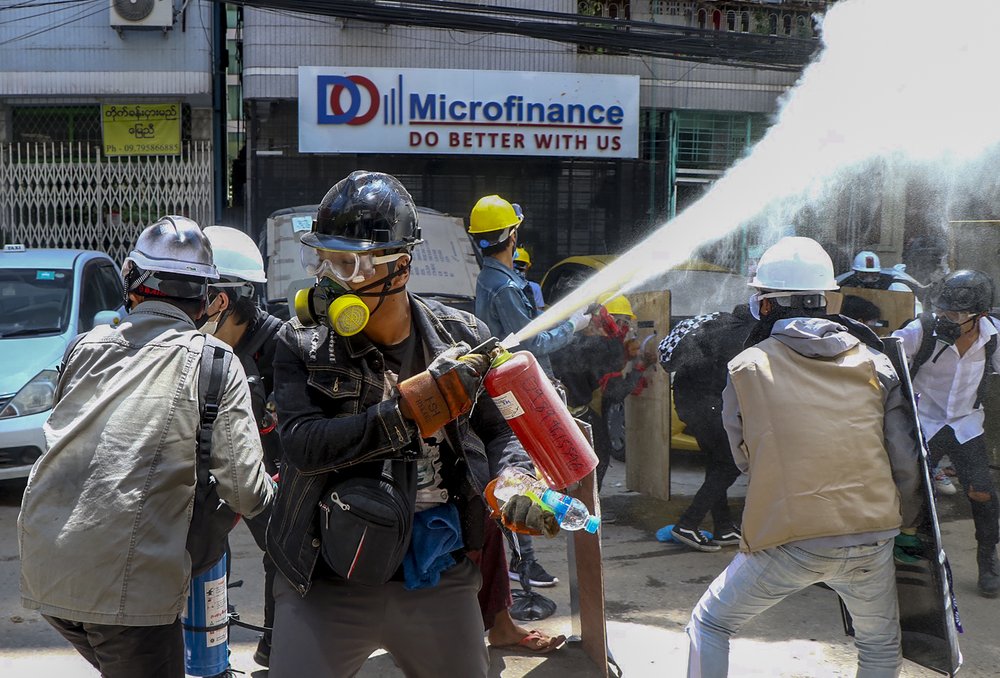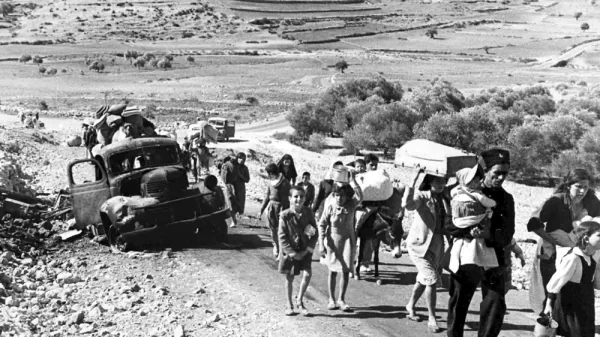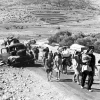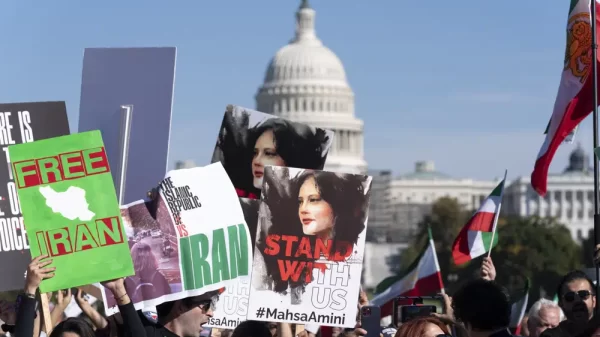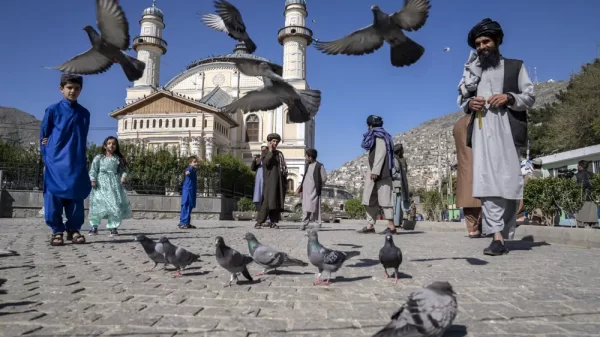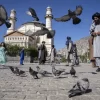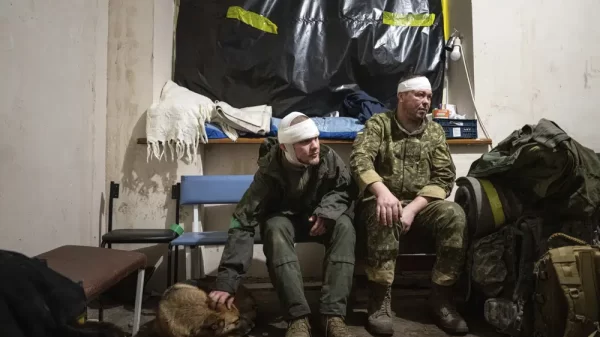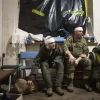Anti-coup protesters discharge fire extinguishers to counter the impact of the tear gas fired by police during a demonstration in Yangon, Myanmar Thursday, March 4, 2021. Demonstrators in Myanmar protesting last month’s military coup returned to the streets Thursday, undaunted by the killing of at least 38 people the previous day by security forces. (AP Photo)
YANGON, Myanmar (AP) — Footage of Myanmar security forces chasing down demonstrators protesting a coup, shooting a civilian at point-blank range and savagely beating others have revealed the extent of a brutal crackdown that saw 38 people shot and killed in a single day.
Despite the shocking violence the day before, protesters returned to the streets Thursday to denounce the military’s Feb. 1 takeover, as many hoped that the increasing death toll would force the international community to take stronger action than it has so far. The U.N. Security Council is scheduled to meet Friday.
U.N. special envoy for Myanmar, Christine Schraner Burgener, described Wednesday as “the bloodiest day” since the takeover, when the military ousted the elected government of leader Aung San Suu Kyi. More than 50 civilians, mostly peaceful protesters, are confirmed to have been killed by police and soldiers since then, including the 38 she said were killed Wednesday.
While details of deaths have been hard to confirm, social media has been flooded with images of security forces targeting protesters and other civilians.
”I saw today very disturbing video clips,” said Schraner Burgener, speaking to reporters at the U.N. in New York via video link from Switzerland. “One was police beating a volunteer medical crew. They were not armed. Another video clip showed a protester was taken away by police and they shot him from very near, maybe only one meter. He didn’t resist to his arrest, and it seems that he died on the street.”
She appeared to be referring to a video shared on social media that begins with a group of security forces following a civilian, who they seem to have just pulled out of a building. A shot rings out, and the person falls. After the person briefly raises their head, two of the troops drag the person down the street by the arms.
In other footage, which appears to be pulled from a security camera, about two dozen security forces, some with their firearms drawn, chase two people wearing the construction helmets donned by many protesters down a street. When they catch up to the people, they repeatedly beat them with rods and kick them. One of the officers, who appears to offer direction to some of his comrades at one point, is filming the brutality on his cell phone.
In another video, several police officers repeatedly kick and hit a person with rods, while the person cowers on the ground, hands over their head. Officers move in and out of the frame, getting a few kicks in and then casually walking away.
Wednesday’s shocking death toll and the sheer volume of footage of brutality sparked outrage, with State Department spokesman Ned Price saying the U.S. was “appalled” at the images of “horrific violence” and the U.N.’s independent expert on human rights in Myanmar, Tom Andrews, saying the “systematic brutality of the military junta is once again on horrific display.”
“I urge members of the UN Security Council to view the photos/videos of the shocking violence being unleashed on peaceful protesters before meeting in Friday’s close-door session,” he said on Twitter.
The Security Council has scheduled those consultations on calls to reverse the coup — including from U.N. Secretary-General Antonio Guterres — and stop the escalating military crackdown.
But any kind of coordinated action at the U.N. will be difficult since two permanent members of the Security Council, China and Russia, would almost certainly veto it. Some countries have imposed or are considering imposing their own sanctions.
Even if the council did take action, U.N. envoy Schraner Burgener cautioned it might not make much of a difference. She said she warned Myanmar’s army that the world’s nations and the Security Council “might take huge strong measures.”
“And the answer was, ‘We are used to sanctions and we survived those sanctions in the past,’” she said. When she also warned the army that Myanmar would become isolated, Schraner Burgener said, “the answer was, ‘We have to learn to walk with only a few friends.’”
The coup reversed years of slow progress toward democracy in Myanmar, which for five decades had languished under strict military rule that led to international isolation and sanctions. As the generals loosened their grip, culminating in Suu Kyi’s rise to power in the 2015 elections, the international community responded by lifting most sanctions and pouring investment into the country.
Wednesday’s highest death toll was in Yangon, the country’s biggest city, where an estimated 18 people died. Most if not all of the deaths occurred in the eastern neighborhood of North Okkalapa.
Video at the main hospital there showed grieving relatives collecting the blood-soaked bodies of family members. Some relatives sobbed uncontrollably, while others looked in shock at the scene around them.
There were efforts at holding new protests Thursday in at least three areas of Yangon: North Okkalapa, Sanchaung and Insein, all scenes of violence for the past few days. Police again used tear gas to try to disperse crowds, while protesters again set up barriers across major roads.
Protests also continued in Mandalay, the country’s second-biggest city, where three people were reported killed Wednesday. A formation of five fighter planes flew over the city on Thursday morning in what appeared to be a show of force.
Protesters in the city flashed the three-fingered salute as they rode their motorbikes to follow a funeral procession for Kyal Sin, also known by her Chinese name Deng Jia Xi, a university student who was shot dead as she attended a demonstration the day before. Many thousands of people attended.
As part of the crackdown, security forces have also arrested well over a thousand people, including journalists, according to the independent Assistance Association for Political Prisoners. On Saturday, at least eight journalists, including Thein Zaw of The Associated Press, were detained. He and several other members of the media have been charged with violating a public safety law that could see them imprisoned for up to three years.
Copyright 2020 Associated Press. All rights reserved.




















